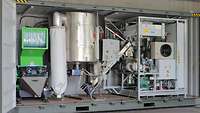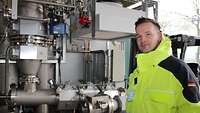
About the agency
The Bundeswehr Research Institute for Materials, Fuels and Lubricants Tests which textiles, fuels and lubricants and chemicals are suitable for the Bundeswehr.


What if we were able to fuel vehicles with plastic waste? This question is currently being explored by the Bundeswehr Research Institute for Materials, Fuels and Lubricants (WIWeBWehrwissenschaftliches Institut für Werk- und Betriebsstoffe) in Erding. At the agency’s site a pyrolysis plant has been put into operation that could make a significant contribution on the way towards a more sustainable energy supply.

The container-based pyrolysis plant completely installed and put into operation.
BundeswehrTanks or protected wheeled vehicles are mobile military systems which often are equipped with very powerful drives. However, space inside and on the vehicles is limited because the vehicle also has to accommodate crew and equipment. Hence, the onboard energy supply should have little additional weight but provide sufficient energy for many kilometers. This means that per weight and volume unit the fuel has to deliver as much energy as possible. The vehicle should cover as much distance as possible requiring as little fuel as possible.
Currently, conventional sources of energy, like fuels produced from oil, offer the best ratio. However, worldwide oil reserves are finite and using them is extremely harmful to the environment. Batteries and hydrogen have a far lower energy density, which ultimately results in a reduced range.
In the field of research called “energy sources of the future” WIWeBWehrwissenschaftliches Institut für Werk- und Betriebsstoffe investigates how liquid sources of energy can be produced from plastic materials by using a pyrolysis plant.

In the laboratory environment, used synthetic materials are decomposed and gradually converted into valuable fuel.
BundeswehrIn this process, called thermal decomposition, plastic materials are decomposed at high temperatures and under exclusion of oxygen. This technology has the potential to become part of the decentralized energy supply within the Bundeswehr in the future.
The oils produced during the pyrolysis can be used as energy sources for generators or mobile systems.
Following the laboratory tests, the process will now be adapted for its use in the Bundeswehr by means of the new plant.

Dr. Christian Marquardt keeps an eye on the pyrolysis plant.
BundeswehrAt present, the aim is to use pyrolysis oils as components to be added to diesel fuel, in order to soon exploit the high-energy content of plastic waste.
Moreover, the pyrolysis process provides an opportunity for decentralized energy supply in military camps, for example. Particularly in combination with synthetic fuels, pyrolysis could make a vital contribution to a resource-conserving energy supply for mobile Bundeswehr systems.
One of WIWeBWehrwissenschaftliches Institut für Werk- und Betriebsstoffe's responsibilities is the quality of fuels used within the Bundeswehr. For quite some time, the focus of research has been on synthetic fuel production. As a sustainable alternative to fossil fuels, this research approach is particularly important for energy-intensive applications.
By establishing a focal area for energy sources of the future, the focus of research was broadened to include sustainable energy sources and storage for mobile applications. There is a close cooperation in this research area with the Bundeswehr Technical Center for Land-Based Vehicle Systems, Engineer and General Field Equipment in Trier (WTDWehrtechnische Dienststelle 41). This agency - with respect to camps - also deals with concepts for sustainable energy supply.
In addition, all Bundeswehr research activities in this field need to be coordinated and an efficient cooperation with external research facilities needs to be established.
The plant was procured last year within twelve months by the Land Support Directorate at the Federal Office of Bundeswehr Equipment, Information Technology and In-Service Support (BAAINBwBundesamt für Ausrüstung, Informationstechnik und Nutzung der Bundeswehr). Within the framework of the Europe-wide invitation for bids, a start-up from Saxony asserted itself against the competitors and was awarded the contract. The final setup and activation, which was delayed due to the COVID-19Coronavirus Disease 2019 pandemic, has now been completed.
This kind of plant is a fundamental and forward-looking innovation in the field of chemistry at WIWeBWehrwissenschaftliches Institut für Werk- und Betriebsstoffe and within the entire Bundeswehr.
by Jara Kürschner und Dr. Sebastian Scheuermann
The Bundeswehr Research Institute for Materials, Fuels and Lubricants Tests which textiles, fuels and lubricants and chemicals are suitable for the Bundeswehr.